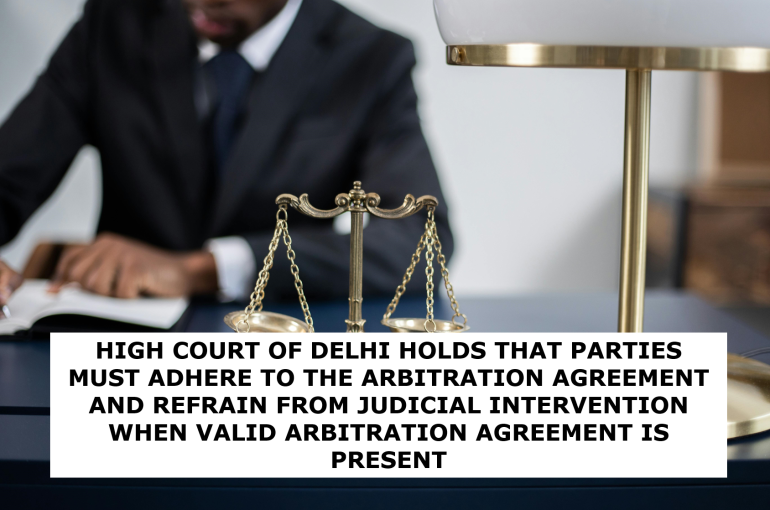HIGH COURT OF DELHI HOLDS THAT PARTIES MUST ADHERE TO THE ARBITRATION AGREEMENT AND REFRAIN FROM JUDICIAL INTERVENTION WHEN VALID ARBITRATION AGREEMENT IS PRESENT
A single Judge Bench of High Court of Delhi comprising of Justice Dinesh Kumar Sharma passed a judgement dated 08.11.2024 in the matter of Balaji Steel Trade v. Fludor Benin S.A. and Ors. CS(COMM) 544/2023 wherein the Bench held that parties must follow the arbitration agreement if the seat of arbitration is already decided in a dispute.
Facts
The Plaintiff, is a partnership firm engaged in steel trading and agricultural products. The Plaintiff entered into a Collaboration and Buy Back Agreement with Defendant No. 1 which is a private limited company based out of Benin on 10.12.2018, which included an arbitration clause for disputes to be resolved in Benin.
Subsequently, a Buyer Seller Agreement (BSA) was executed on 06.06.2019, which superseded the Collaboration Agreement and also contained an arbitration clause specifying arbitration to be held in Benin. An Addendum to the BSA was signed on 09.01.2021, allowing Defendant No. 1 to sell its products to third parties while prioritizing the Plaintiff’s orders.
Later, disputes arose between the Plaintiff and the Defendants regarding the supply of products and financial liabilities, leading the Plaintiff to issue a Legal Notice dated 15.07.2022 to all Defendants. Meanwhile, the Defendant No. 1 initiated arbitration proceedings in Benin, which led to the Plaintiff to seek a permanent injunction against these proceedings in India by filing a commercial suit in the High Court of Delhi.
The Plaintiff contended that the arbitration proceedings in Benin were invalid, claiming that the seat of arbitration was India based on subsequent agreements like Sales Contracts and High Sea Sale Agreements (HSSA) that included arbitration clauses designating India as the seat. The Plaintiff contended that the Defendants had not included necessary parties in the Benin arbitration clauses and that the proceedings were oppressive and vexatious.
Moreover, the Plaintiff argued that Benin was merely a venue for arbitration and not the seat of arbitration as per the Agreement.
Issues
1. Whether the arbitration clause in the BSA and Addendum is valid and enforceable?
2. Whether the BSA and Addendum are separate agreements from the Sales Contracts and HSSAs executed with Defendants No. 2 and 3?
3. Whether the arbitration proceedings should proceed in Benin or under the arbitration clauses of the Sales Contracts and HSSAs, which designate India as the seat of arbitration?
4. Whether the Plaintiff’s claims of oppression and inconvenience regarding the Benin Arbitration are valid grounds to prevent the arbitration from proceeding?
Decision by the High Court
1) On the question of separate agreements, the Hon’ble High Court noted that the Plaintiff did not challenge the existence of the Arbitration Agreements in the BSA and Addendum, which were deemed to be valid and enforceable. The Arbitration Clause in the BSA explicitly stated that the disputes would be resolved in Benin, indicating the parties’ intention to initiate arbitration proceedings in that jurisdiction.
2) The Hon’ble Court found that the BSA and Addendum were distinct from the Sales Contracts and HSSAs, which were separate agreements involving different parties and specific transactions. The arbitration clauses in the BSA and Addendum were not affected by the subsequent agreements, which had their own arbitration provisions.
3) The Plaintiff’s argument that Benin was merely a venue and not the seat of arbitration was rejected. The Hon’ble High Court emphasized that the parties had expressly chosen Benin as the arbitration venue in their agreements. The Hon’ble Court highlighted that the Arbitration Agreement was valid under Section 45 of the Arbitration and Conciliation Act 1996 (Power of judicial authority to refer parties to arbitration), which mandates referral to arbitration unless the agreement is found to be null, void, or incapable of being performed.
4) The Hon’ble Bench determined that the Plaintiff’s claims regarding the oppressive nature of the Benin arbitration and the failure to include necessary parties were beyond the scope of inquiry under Section 45. The Plaintiff’s concerns about the inconvenience of conducting arbitration in Benin were not sufficient to invalidate the Arbitration Agreement.
Hence, the Hon’ble High Court was of the view that the Arbitration Agreement which provided the seat of arbitration to be Benin was valid and Hon’ble Court did not find any issues related to the jurisdiction or its enforceability.
Conclusion
The High Court of Delhi allowed the application filed by Defendant No. 1 under Section 45 of the Arbitration and Conciliation Act, referring the parties to arbitration in Benin. The Plaintiff’s Suit was dismissed, with the Court affirming that the Arbitration Agreement in the BSA and Addendum was valid and enforceable. The Plaintiff was advised to seek appropriate remedies under the BSA and Addendum as per the law, given that an award had already been issued in the Benin arbitration.
ARJAV JAIN
ASSOCIATE
Editor’s Comments
Indian Courts have time and again highlighted the fact that if an arbitration agreement is valid and binding parties must follow it to the last letter. Probably one of the reasons for insisting on independence of the arbitration proceedings is to help this alternate dispute resolution mechanism to work as a successful alternative to court proceedings. The judgment highlights the importance of adhering to agreed arbitration clauses and the limited scope of judicial intervention in arbitration matters, particularly when the parties have explicitly chosen a jurisdiction for arbitration.
SUSHILA RAM VARMA
ADVOCATE AND CHIEF CONSULTANT
THE INDIAN LAWYER & ALLIED SERVICES





































Leave a Reply